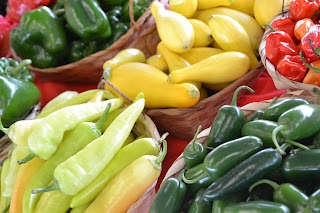Originally published in the July 24, 2013, issue
Though his wife grew up on a farm in
Iowa, Jack Morgan didn’t have any agricultural experience until a little more
than 20 years ago. When he retired from the armed forces, the Morgans moved to
Canton, Ga., and decided to plant some apple trees.
“Then I went to blueberries. I started
out with about 12 blueberry bushes and they did well,” Jack Morgan said. “Then
I multiplied it and we went up to probably 100 bushes. … So then I put in some
blackberries.”
 |
Producer Jack Morgan examining his blueberry bushes on
the farm in Canton, Ga. Photo by Dallas Duncan |
Now, what started out as a small hobby
farm is a flourishing pick-your-own agritourism enterprise. The Morgans’
property, nestled in the cool north Georgia property, is full of blueberry and
blackberry bushes, apple trees, two bee hives, an experimental plot of corn,
some grape vines and more. It’s dotted with ornamental horticulture plants
propagated by Mary Jo Morgan, who was Cherokee County’s first Master Gardener.
“Farming was new to Jack because he grew
up in Detroit,” Mary Jo Morgan said. “But he’s always had a knack for it.”
Though not all the crops are up for
grabs by the public, The Berry Barn has been a pick-your-own farm for about 16
years.
“People that come out really enjoy it,”
Jack Morgan said. “Sometimes they’ll bring their picnic. We do a little bit
with the special needs children. They come out and pick and it gives me
something to do so I’m not just sitting around.”
He said opening this type of business
has been “exceedingly” popular. His picking times are appointment only, and he
ends up having to turn people away.
 |
Blackberries are just one of the crops visitors can take home
from pick-your-own farms like The Berry Barn in Canton,
Ga. Photo by Dallas Duncan |
“I get about 20 phone calls a day, and I
would say there’s probably at least 100 that come out,” Jack Morgan said. “We
have a good time, and it keeps us busy.”
There are roughly 125 pick-your-own
farms listed in Georgia, said Cindy Norton, agritourism manager for the Georgia
Department of Agriculture. The most popular crops grown on these farms are
berries – blackberries, blueberries and strawberries.
Jack Morgan said blueberries are the
most popular crop people pick at The Berry Barn. They’re perfectly ripe when
they’re a deep, navy blue color, but if picked while still slightly red, they
will ripen up after a day or two.
When it comes to starting a blueberry
crop, he advises starting out with three bushes of at least two varieties. The
first year they need water, but after that, he said they’re almost entirely
self-sufficient. They do need acidic soil and though they work well in the sun,
they do not need full sunlight to be successful.
In addition to the picking enterprise,
the barn itself is home to a small farm store where visitors can pick up their
buckets and browse homemade jams, jellies, orchard honey and Mary Jo’s
watercolor artwork.
Many adult pickers bring their kids with
them, and the Morgans have something special on those occasions – a blackberry
plant children can take home and grow themselves.
“These grow very well – in other words,
easy,” Jack Morgan said. “I hate to give children something they put in the
ground and it dies.”
 |
A visitor to The Berry Barn in Canton,
Ga., picks blueberries in mid-July.
Blueberries are one of the most popular
pick-your-won crops in Georgia. Photo
by Dallas Duncan |
Norton advises producers who want to
create a pick-your-own operation to check with their local government,
Extension services and farm insurance agent to determine additional
regulations, requirements and liabilities. For those who don’t already farm but
are interested in following the Morgan’s hobby pick-your-own model, she said to
see what such farms exist in the area already, visit them and ask their advice.
“Separate your you-pick from your
commercial growing sites so there will not be any confusion,” Norton said.
“Look at what you might need: bags and buckets; scales if done by weight;
water, restrooms, payment methods.”
She said visiting pick-your-own
operations is an opportunity to experience the farm, especially for consumers
who aren’t able to grow in their own backyard or apartment garden.
“You are able to take your kids to see where
their food comes from, have a little physical activity and spend time together
that will create a lifetime of memories,” Norton said. “It supports our local
farmers and best of all, it’s Georgia-grown!”





















